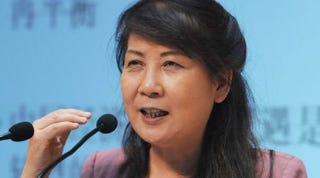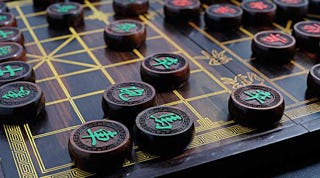Shortly before the publication of a Resolution on history, passed by the 6th Plenum of the 19th Central Committee on 10 November 2021, I presented some views and forecasts via Zoom to a professional expat group in Beijing.
The point was to throw light on the event and the Resolution’s likely contents, (we only had Xinhua’s longish Communiqué at that point). See overheads of my presentation here.
Xi Jinping’s frequently-invoked ‘baseline thinking’ [底线思维 dǐxiàn sīwéi] was, I argue, visible in the subtext. It would likely come up in the Resolution itself, if not explicitly, then tacitly.
Our curiosity about the baseline concept and its implications was a starting point of this Substack. It’s still an open project: let’s not rush to judgment. Yet now, with ‘new era’-defining texts, is a unique chance to draw some of the threads together.
Fussy linguistic point: dǐxiàn 底线 is often translated by the familiar term bottom line. But it’s inappropriate here.
starting as a piece of accounting jargon, bottom line is now popular as a figure of speech, often meaning ‘at the end of day’, or ‘ultimately’
baseline is a lot older, featuring in games like baseball, where it means, not a bottom, but a basic line: one from which others are measured, and very often, one which should not be crossed
The following is a blend of some of the ideas offered in my Zoom presentation. (Some of the links go to translations that are behind a paywall. Making them available to all subscribers is a minor chore, planned for the next few days).
‘Baseline thinking’
—shores up outcomes, but will it propel Xi Jinping Thought into the company of Mao and Deng?
Launched at the 19th National Party Conference (2017), Xi Jinping new era thought on socialism with Chinese characteristics flagged Xi’s aura and agenda displacing his predecessors’, rivalling even those of Mao and Deng. The July 2021 inauguration of a Research Centre for Xi Jinping Thought on Diplomacy was an extension of this bid.
Much of the content of Xi Thought however is undramatic: the hooks and catch-cries of Mao and Deng Thought are lacking, or have failed to catch on. Enter ‘baseline thinking’ dǐxiàn sīwéi 底线思维, a compact buzz-term recently invoked in regard to the Party’s tough measures against COVID-19.
A common expression in recent ethical debates, ‘baseline’ indicates the absolute limit of some value. For instance historian Qin Hui’s The Common Baseline of Modern Thought, . But new connotations are being added. The use and implied meaning of baseline thinking in many domestic spheres, and on the global stage where it is quite a bit narrower in meaning, demonstrate its versatility.
the national baseline
Domestically, baseline thinking is called on in field after policy field to invoke worst-case scenarios. Some examples
Cybersecurity: A set of ‘seven baselines’ for a ‘healthy online environment’ was foreshadowed in 2013.
Poverty alleviation: A high priority for the Xi administration, it must deal in outcomes, not intentions. Epidemics and floods provide no pretexts for failing. Baseline thinking in Party and state agencies keeps officials focused on realising top-down directives; it connects to the Party loyalty/sincerity complex.
Macroeconomy: Zuo Xiaolei 左小蕾 independent economist explains the dramatic new paradigm of ‘dual circulation’ in terms of baseline thinking. Framing it as essentially defensive, defined by worst-case scenarios, she cites nameless ‘inalterable reasons’ for China’s loss of development prospects in the advanced Western economies.
Rural governance: Zhou Zhihong 周志红 Party secretary of Xiantao, Hubei, cited the imperative to strengthen baseline thinking in response to a deadly flash explosion in a chemical factory. Hygiene must be rigorous, safety requirements better understood, and both enforced in a ‘harder style’. Thus, the Beijing refrain structures admonishment in a rural centre.
Top-down calls can run into trouble when they reach the grassroots. Warnings to avoid formalism and bureaucratism are instructions for officials to ‘do something’, but not simply for the sake of appearances: local cadres must be on the front foot when toeing the Party line. Shortcomings, such as inadequate adherence to safety standards, are easy to chastise, but experiments that depart from the baseline bear severe political risk, and are viewed as disloyal (and ‘insincere’). Sounding the alarm over a new and unknown virus spreading through Wuhan was a case in point: public-spirited as it might seem, the Party baseline was divorced from that of the public.
global impact: zero sum vs ‘least worst’
A different ideological setting operates in foreign relations. In a recent op-ed, Xi apostle Zhang Weiwei 张维为 builds a narrative aiming squarely at Western criticism of Beijing’s Hong Kong policy: baseline thinking is precious Party IP, expressed by Chairman Xi in a strict line of descent from strongman-intellectuals Mao and Deng. Zhang claims a single lineage that runs from Mao and Deng and extends to Xi.
at the end of the day
Baseline thinking functions as a master control, taking on more or less benign implications for lower-order policy measures, e.g. in COVID-19 response, Hong Kong policy, the South China Sea and the India–China border, depending on upper-level needs. On the domestic side, the result is variable. Deng’s reforms started by ending the vicious, overwhelmingly zero-sum doctrinal struggles of the late Mao era. Many, though not all, state–society tensions could then be eased using least-worst strategies.
It is when baseline thinking is transposed to the global arena that deep troubles emerge. ‘Least-worst’ strategies are read by counterparts as ‘zero sum’—ironic given Beijing’s huge propaganda attack on ‘Cold War’ thinking.
‘Dual circulation’, less explosive politically yet powerful in its economic implications, has not yet, according to Zuo Xiaolei, been equipped with all the baseline thinking it requires. Its essentially defensive motivation, she tells us, arises from ‘inalterable reasons’ separate from mere trade frictions.
Beijing Baselines doesn’t need to rush to judgement on these issues. We can gain insight, I hope all will agree, by looking at these assumptions and ideas in the light of rationality and sincerity, about which there is a lot more to be said.
profiles
Zuo Xiaolei 左小蕾 | independent economist
Zuo has been State Council counsellor and Galaxy Securities chief economist. She co-wrote confidently in the past (with Lin Yifu 林毅夫, Peking University National Development Research Institute professor, at that time also a State Council counsellor) about the prospects of BRI building industrial parks in Africa. She had attracted notice earlier: ‘“The government has to move before the bubble bursts and destroys the overall economy,” said private-sector economist Zuo Xiaolei in unusually frank comments to state-run China Daily newspaper’ (cited in Foreign Affairs, 2010).
Zhang Weiwei 张维为 | Fudan University China Model Research Centre director
‘One of China’s leading and best-known thinkers’, Fudan University graduate Zhang has long been convinced of Western decline due to civilisational decadence combined with arrogance about its political system. He is known as a Xi surrogate, invoking ‘baseline thinking’ to frame Xi Jinping Thought as early as 2017. Selling over a million copies globally, Zhang’s book The China Wave (2014) claimed it is ‘unimaginable that most Chinese would ever accept multiparty democracy.’ He is a former visiting fellow at Oxford University, was professor of international relations at the Geneva School of Diplomacy and International Relations and senior research fellow at the Centre for Asian Studies, University of Geneva.
zero-sum strategy and least-worst strategies
By-products of game theory, the now-common terms ‘win-win’ and ‘zero sum’ are basically opposites. Zero-sum loosely describes winner-take-all contests, where failure to win means annihilation, hence drawing is as bad as losing. Games in chess tournaments (as opposed to stand-alone games) are ‘not zero sum’: a draw can be highly desirable, sometimes adding up to an overall tournament win. ‘Least-worst’ situations take stock of worst-case scenarios; a loss now may add up to a win in further rounds. While inferior to a win, a draw is on this score certainly better than a loss.






Thank you for highlighting the new rhetoric form Beijing. This pivoting from zero-sum game to a minimization of maximal risk (the min-max problem in system designs) is a crucial and welcoming policy orientation. The histrionic war rhetoricians on both sides may catch all the buzz and sell all the copies, nevertheless, the game is played with chess masters, not the hecklers. thank you for posting your thoughts!
The sentence beginning 'The common baseline of Modern Thought' was left incomplete (I went hunting for the quote). For the record, Qin Hui posits that the common baseline is 'liberty'. Of course, he doesn't mean 'licence', e.g. being entitled NOT to protect others from your own viral infection: 'liberty' for one can NOT be at the expense of liberty for others.